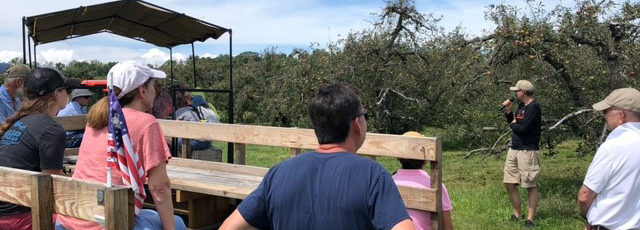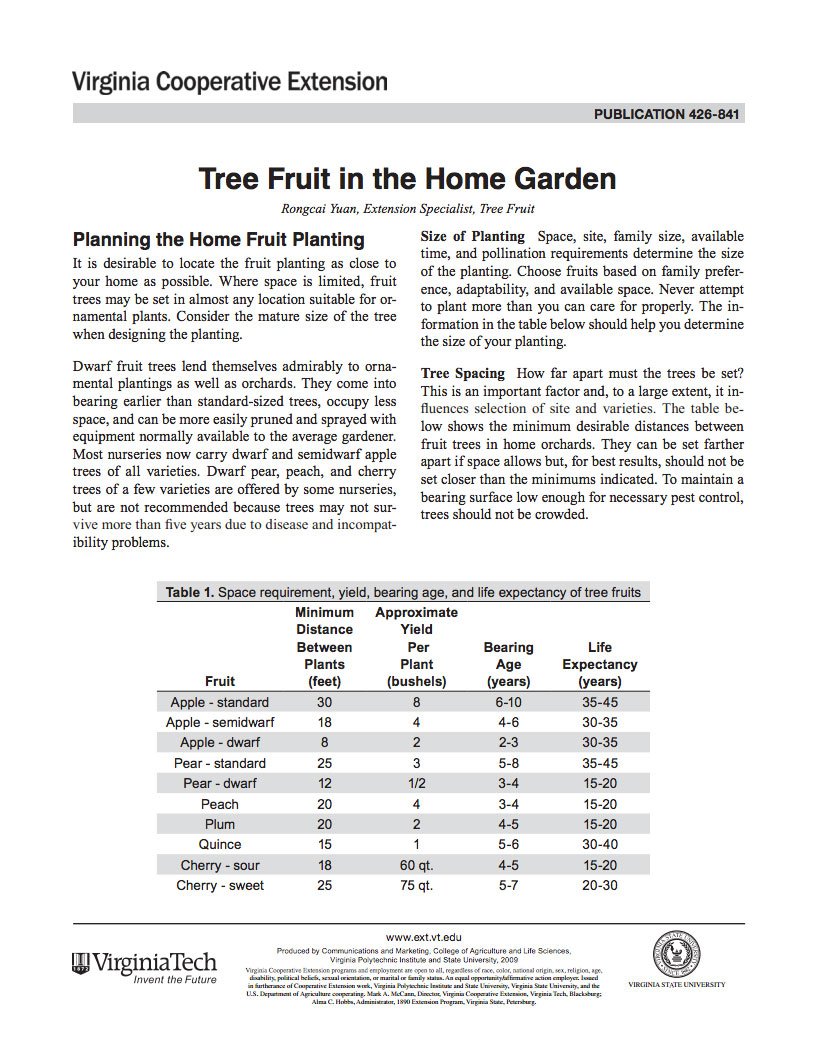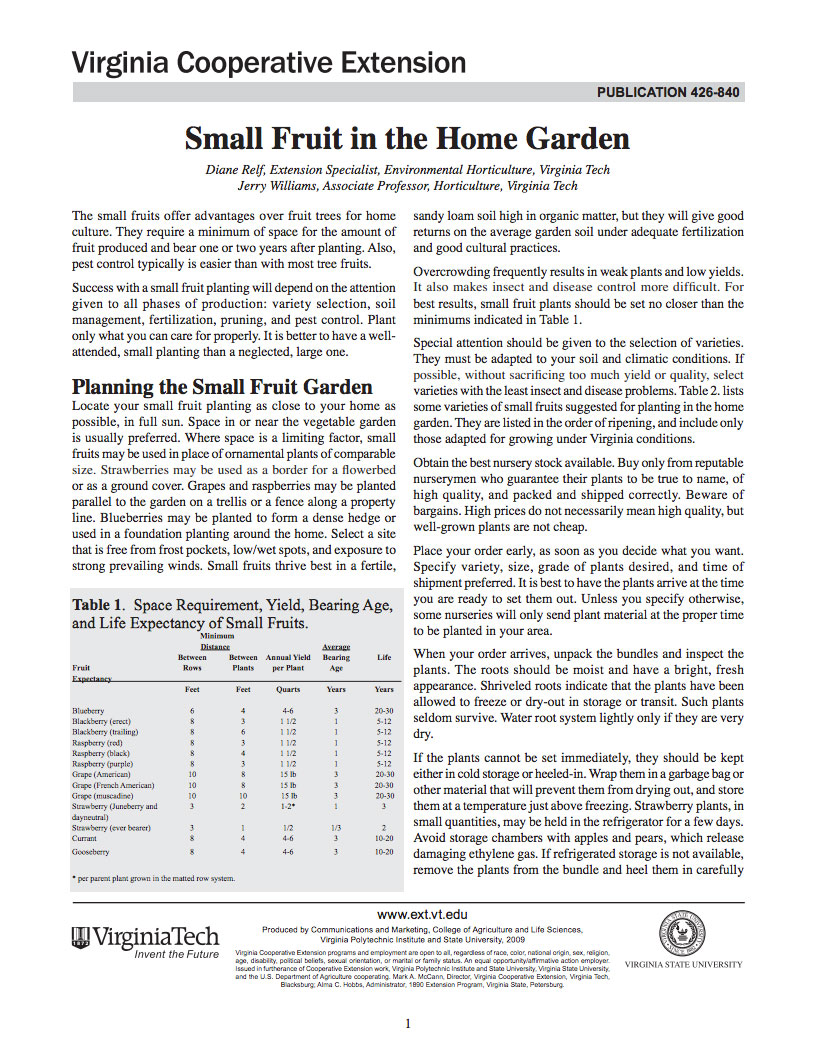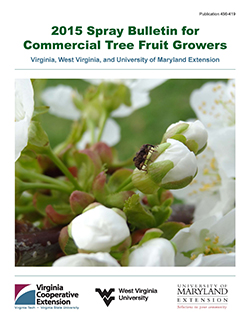Tree Fruit

We are a collective team of Extension specialists and agents who deliver year-round programming for the Commonwealth’s tree fruit producers. We provide our stakeholders with the latest research-based information for making sustainable management decisions on their farms. We also develop resources for beginning farmers and home fruit enthusiasts. Our information is disseminated through this website, Extension publications, workshops, on-farm meetings, and one-on-one conversations.
Seasonal updates from Virginia Tech's tree fruit extension specialists and agents. Click on a title to read the full post. Or, visit the blog homepage for Horticulture (Sherif Sherif), Disease Updates (Srdjan Acimovic), or Pest Management (Chris Bergh) to read previous postings.
AĆIMOVIĆ LAB
- First Apple Bitter Rot Symptoms in 2025 Visible in Winchester, VA, on 7/1/2025: Keep Up Regular Cover Sprays to Protect Fruit with Fungicides Jul 02, 2025
- Multiple Hazards In Effect; Hazardous Weather Outlook – Hail Possible In Evening 6/8/2025: Be Prepared to Apply Streptomycin Tomorrow if You Get Hail Jun 08, 2025
- (I) Fire Blight Visible From 5 to 12 May in Southern and Central VA; (II) Phytophthora Root and Crown Rot a High Risk with Excessive Rains; (III) Primary Scab Season Over, But Keep Up the Fungicide Applications for 2 Weeks More May 22, 2025
- Spray Strong: Apple Bitter Rot Infections a High Risk in 2025 – Alternate FRAC 11, Aprovia, Omega and Captan Fungicides May 19, 2025
- (I) Apple Scab Infection Predicted For Rains 11- 14 May; (II) Keep Applying Streptomycin in Cider Apple Cultivars if Flowers Are Still Opening May 11, 2025
- First Symptoms of Apple Scab, Powdrey Mildew and Cedar Apple Rust Infections Visible from 2 May May 09, 2025
- Major Apple Scab Infections 2-5 May With Predicted Rain Events Ahead (Plus Fire Blight Infections Where Flowers Still Opened) Apr 30, 2025
- Fire Blight Infections Predicted in NEWA EIP Model With Showers 29 April – 2 May, Varying Across Virginia Apr 29, 2025
- How to Manage Diseases in Apple Orchard After a Frost Destroyed the Commercial Crop (Off Year) Apr 28, 2025
- Major apple scab and fire blight infections predicted for 25 – 27 April 2025 rains: Powerful Spray Protection Needed Apr 24, 2025
Virginia Tech offers a number of publications with information about growing fruit for personal consumption. These publications are written by our extension specialists and contain research-based information.
- Pest Management Guide: Home Grounds and Animals. The Pest Management Guide contains information on how to control pests and diseases of many crops, including fruit trees.
- A home fruit spray guide organizes the printed information into table and can be used as a quick reference guide.
- The Mid-Atlantic Orchard Monitoring Guide is the go-to resource for information about insect and disease identification and monitoring, including many color photographs.
- Additional information about gardening can be found under the Home and Garden Section of the Virginia Cooperative Extension Publications Website.
Virginia’s varied topography and large geographical area allows for the production of tree fruits in many parts of the Commonwealth, with the majority of orchards located in the Northern Shenandoah Valley and along the slopes of the Blue Ridge Mountains. The 2007 U.S. Census of Agriculture reported 13,774 acres of apple, 1,538 acres of peach and nectarine, 171 acres of pear, and 99 acres of sweet and tart cherry orchard in the Commonwealth (USDA-NASS, 2007). Nationally, Virginia is the sixth largest producer of apples.
Between 2009 and 2011, the average annual value of Virginia’s apple crop was $35 million, while the peach crop was valued at $5 million over that same period (USDA-NASS, 2012).
About 70% of the apples grown in Virginia are used for processed products, but fresh market apples account for 57% of the farmgate value. These figures do not include value added through processing into products such as fruit slices, applesauce, juice and cider, vinegar, and alcoholic beverages, which are all important for the overall profitability of orchards.
Additional economic and social benefits of Virginia’s orchards add significant value to fruit production in the state. Current production trends indicate increased tree-fruit production for direct marketing and agritourism enterprises.
Visit Virginia Apples to learn more about commercial fruit production in Virginia. Find additional statistics about Virginia orchards in the 2005 Virginia Orchard Survey and through the USDA-NASS Virginia Field Office.









